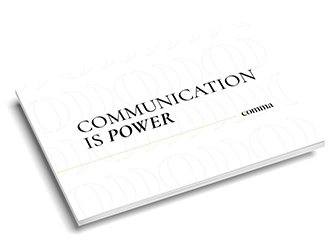The financial and fintech sector is in the midst of a transformation, driven on the one hand by the continuous technological innovations that are already being implemented, such as digital assets, blockchain, web 3, generative artificial intelligence, the machine learning the big data, etc. On the other hand, a changing regulatory environment, increased competition and new customer demands. In this context, communication emerges as an essential strategic asset for public and private organisations, and even professionals, to convey this evolving story, differentiate themselves and increase trust.
We are facing a global paradigm shift, where communication plays a crucial role in this transformation of the financial and investment industry. The rapid evolution of communication requires agile adaptation to emerging trends. However, many traditional brands remain resistant to change, persisting with outdated strategies and underestimating the power of new tools and approaches.
The universe of banking, asset management, investment, financial advice, financing, credit, insurance, trading venues, financial markets… and the communications industry itself will no longer be the same. Are we ready?
Differentiation has become a necessity for all players in the financial and technology ecosystem. If they don’t know you, you don’t exist, ergo you don’t sell. Last year we predicted for the financial sector in our blog that in order to differentiate themselves, brands in the sector would have to implement agile, flexible and proactive communication, capable of anticipating and responding to the needs and expectations of different audiences, both internal and external. We also recommended collaborating for common causes. Have we? Only in part.
The more traditional players focused on institutional business, such as asset managers and wealth advisors, in general, continue to do what has been working for them so far, both in communication and in their business. But the world is changing and what has worked for them today may be obsolete in no time. However, we perceive that they are still reluctant to try new tools, often held back by their internal organisational policies or their size. They are like that ship stuck in the canal. They find it hard to turn. How are they going to catch the technological wave if they are in the first year of digitisation, without knowing how to organise their information and data?
There is still a lack of win-win industry collaboration to communicate together for common causes.
Meanwhile, the new disruptors, mainly technological, appear as saviours with ideas that come to solve problems that are not new, such as democratising access to investment. They show themselves as heroes, pioneers, the ones who will finally solve what no one else could. And, suddenly, they discover that they don’t know what to tell, nor how, nor to whom, and they pretend that, without a budget, communication works magic: to turn into leads that promise that will transform the world.
Although everything is changing, the financial sector is struggling to change. As communication experts, we continue to demand, as my colleague Silvia Albert, founder and CEO of comma, employers’ organisations such as ADC or associations such as Dircom has so often demanded, a higher authority. However, organisations continue to mix the instruments of communication without a score, without relying on a maestro to sit on the steering committee and move his baton so that the corporate narrative is a perfect melody.
So how do we catch the wave of communication that sets us apart in the ocean of technological transformation?
10 key trends for successful communication in the financial and fintech sector

We summarise the essential keys to communicating in the financial and technology sector in 2024
- Creativity for differentiation. Differentiation requires exceptional creativity. In a saturated landscape, it is essential to highlight the value proposition and competitive advantage. Multi-disciplinary communications teams help to connect those dots capable of creating campaigns that resonate.
- Coherence of the story in the various channels: As traditional media lose influence to digital channels, consistency of message is crucial. Adapting to different channels without losing the essence is a key challenge.
- Ability to adapt to changing regulations: With the advent of regulations such as Mifid III – which will bring the end of retrocessions (finally-, PSD3, and the evolution from open banking to open financeand afterthe first European regulation for the crypto-assets market, Mica or the first European regulation for AI, it is imperative to keep abreast of legal changes and adjust communication strategies accordingly.
- Emphasis on regulatory and ethical compliance. Technology and innovation are ahead of regulations. It is not essential to have regulation in order to act according to good practice criteria. We must anticipate and identify what ethical issues may arise, acting – without the need for spotlights – in a coherent way between what we are and what we do. To this end, communication is consolidated as the strategic and fundamental tool of common sense and as a ensuring the common good through business practice.
- Ensuring privacy and cybersecurity: in a digital world, privacy and cybersecurity are priorities. Communication must address these concerns when handling and disseminating information.
- Building trust in a distrustful environment: Lack of confidence in the financial sector and technological innovations is a persistent challenge. Polarity, opinion bubbles and information superficiality do not help, as our report on the Blockchain and digital assets conversation. Honest and transparent communication can help rebuild trust, ensure reputation and visibility, and help build customer loyalty.
- Proactive adoption of new technologies: artificial intelligence, blockchain and other emerging technologies offer opportunities to improve efficiency and personalisation in communication. The financial sector is very risk-averse, but if you don’t take risks, you don’t win; Proactive adaptation is key and we must apply these tools in our communication strategies.
- Personalisation of the message: Knowing your audience’s preferences allows you to personalise your message to drive loyalty and retention. Technology facilitates this precise adaptation. The challenge is not to lose the thread of the corporate story. Each communication shall be unique. In addition to the usual channels, there are others: chatbots, streaming platforms, podcasts, webinars, audio, metaverses, video games….
- Collaboration for causes that seek the common good. Collaboration on campaigns focused on common causes, such as financial literacy or sustainability, can generate positive impact and strengthen brand reputation.
- Building communities and generating engagement: using technologies such as blockchain to create and value communities, and fostering engagement, involvement and co-creation are key to long-term success. For example, collections of NFTs can be created or transactions can be sealed with smart contracts. Everything remains to be done. Creativity has no limits now.
7 powers of the consultant so that AI doesn’t take your job

Bonustrack, I could not help but reflect on what the tsunami of new technological tools implies for those of us who work in communication. Personally, I think it will allow us a high degree of automation of low value-added processes and we will be able to focus more on thinking and creating.
In order not to be left behind, curiosity and continuous learning are essential. As our colleague says, Roberto Carreras: “AI is not coming to take away our jobs, those who know how to use it will do it”.
Artificial intelligence and automation will enable us to increase productivity and efficiency. According to a McKInsey report, Generative AI could contribute between 5 and 15 per cent of the total investment in marketing productivity, or US$ 463 billion. We will be able to eliminate routine tasks, allowing communication professionals to focus on more creative and high-level strategies.
These will be our powers:
- Hyperspecialisation The key to adapting to market dynamics and being able to devise communication strategies that make sense and make a difference is a deep understanding of the financial and technology sector.
- Proficiency in emerging technology: It is urgent to be self-taught, not to close yourself off from learning how to use all the tools at your disposal, and to keep up to date in a constantly evolving environment.
- Clear and informative communication: One of the consultant’s most special superpowers is his ability to make the incomprehensible understandable. We need to cultivate those skills to communicate clearly and accessibly in a complex financial and technological environment.
- Creativity and adaptability: creativity and adaptability are essential to stand out in a saturated and constantly changing market.
- Emphasise public relations: Tell me what network you have and I will tell you what you can achieve; Building long-term relationships based on trust with journalists and specialised content creators does not happen in two days. Our relationships have a lot of value and cannot (yet) be replaced by machines.
- Ethics: Good professionals must first be good people. Putting the customer at the centre and following ethical principles is essential to building a strong reputation. Practices such as being transparent, not charging hidden fees and even recommending a competitor for a particular campaign will keep customers coming back to you.
- Data analysis: we must learn to use analytics and data tools to measure the success of campaigns and make informed decisions. This will allow us to create stories from the data; What is not measured does not exist.
Conclusion;
We live in exciting times to constantly reinvent ourselves. The financial industry is going to transform exponentially with new technologies and they will need communication professionals capable of accompanying them on such a journey. Financial and technological communication will experience epic and exciting feats. Keeping up to date, cultivating creativity and constantly adapting are key elements for success in this dynamic industry that will, at least for the time being, prevent our automation.







